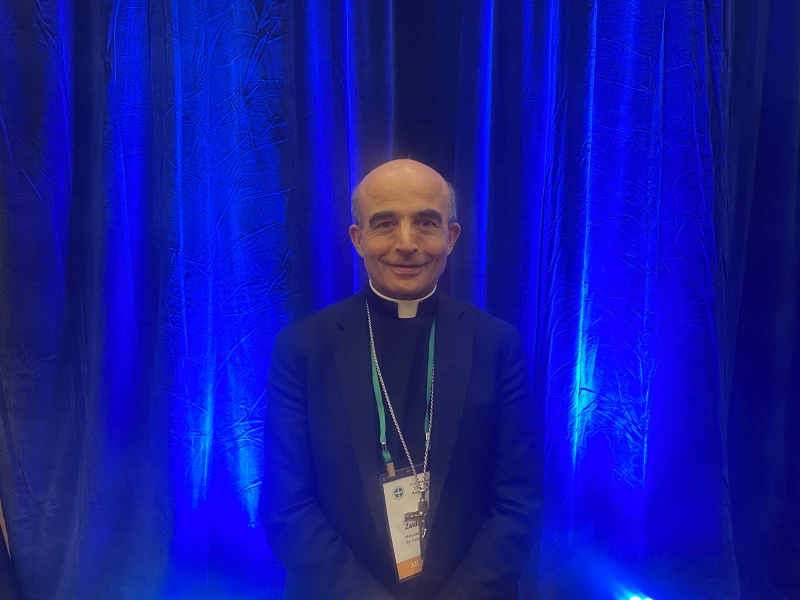
Bishop Abdallah Elias Zaidan of the Eparchy of Our Lady of Lebanon of Los Angeles serves as chairman of the U.S. Conference of Catholic Bishops’ Committee on International Justice and Peace. / Credit: Joe Bukuras
Washington, D.C. Newsroom, Oct 2, 2025 / 14:16 pm (CNA).
As negotiations between Israel and Hamas continue, Bishop A. Elias Zaidan is urging Catholics to pray for a peaceful conclusion to the nearly two-year-long armed conflict in the Gaza Strip.
“As an international community and people of faith who deeply care for all our brothers and sisters who live in the land of Christ’s life, death, and glorious resurrection, we cannot lose this opportunity for peace,” Zaidan, who chairs the United States Conference of Catholic Bishops’ (USCCB) Committee on International Justice and Peace, said in an Oct. 1 statement.
“I call on Catholics and all men and women of goodwill to, once again, pray ardently for an end to this devastating war,” the bishop implored.
Zaidan’s comments come in response to a 20-point peace plan unveiled by President Donald Trump last week. Israeli Prime Minister Benjamin Netanyahu agreed to the plan. Hamas, which operates the government in Gaza, is reviewing the plan but has not yet agreed to the conditions or provided a counteroffer.
The bishop noted that Pope Leo XIV expressed hope Hamas would agree and quoted the Holy Father’s comments in May, when he said the “deepest purpose of the Church’s social doctrine” is a “contribution to peace and dialogue in the service of building bridges of universal fraternity.”
“In this difficult context, any peace plan will involve challenges that will require the utmost effort and cooperation from all sides,” Zaidan said. “… May Our Lady, Seat of Wisdom, instill on all sides a sincere willingness to attain peace.”
The 20-point peace plan
If Hamas agrees, the war would immediately end, Israel would suspend all military operations, and the battle lines would be frozen. Israel would withdraw its troops once all conditions of the peace deal are met.
Hamas would release all Israeli prisoners, both dead and alive, and Israel would release nearly 2,000 Palestinian prisoners.
Hamas would need to demilitarize and agree to have no involvement in government operations, but all members who agree to decommission their weapons and peacefully coexist with Israel would be given amnesty and be permitted to either remain in Gaza or have safe passage out.
Governance would be transferred to a transitional government comprised of Palestinians and international experts and overseen by the United States president and other heads of state. No one would be forced to leave Gaza, Israel would not annex or occupy the territory, aid would resume, and participating countries would give Gaza a preferred tariff rate.
Arab and other international partners, including Egypt and Jordan, would develop a temporary International Stabilization Force to establish long-term security and train police. The plan would also establish an interfaith dialogue process focused on tolerance and peaceful coexistence.
“Crucially, this plan incorporates Israel’s and Palestine’s neighbors, including Jordan and Egypt, in a multilateral coordination for the plan’s implementation that recognizes the reality of the region’s interconnectedness,” Zaidan said.
“I am especially hopeful of the plan’s ‘interfaith dialogue process,’ which is intended to create a greater sense of community between Israelis and Palestinians,” the bishop added.
The plan states that agreement could establish a “credible pathway” to Palestinian statehood, but does include a timetable or a guarantee. The Holy See recognized statehood for Palestine in 2015, and more than three-fourths of the countries in the world recognize its statehood. The United States and Israel do not.
However, the plan does not address ongoing Israeli settlements in Palestinian territory. After several European countries announced recognition of Palestinian statehood, Israel approved new settlements in the West Bank to divide contiguous Palestinian land. According to the United Nations, Israeli settlement activities have accelerated since June.














